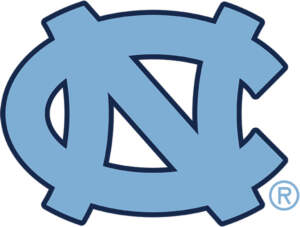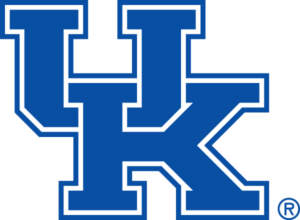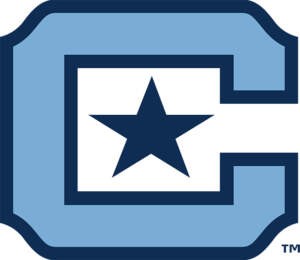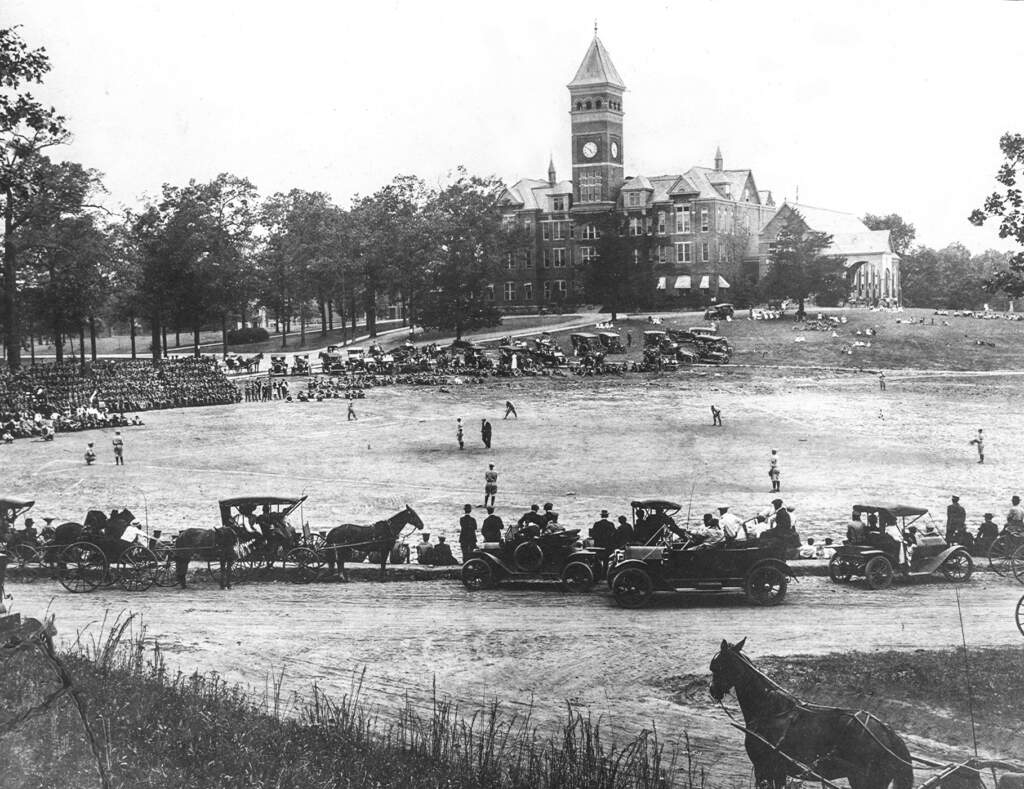Clate Schmidt was eight months old when he took his first step, and the very next day Dwight Schmidt deployed to Bosnia for seven months. Clate was 20 when his father finally returned from overseas for good – they hope – in March, one day before he was set to take the mound for Clemson at Fluor Field in Greenville, S.C.
Colonel Schmidt had flown F-18 fighter jets in the Marines for two decades by then, and the Schmidts had experienced their fair share of emotional homecomings. This wasn’t meant to be one of them.
Dwight and Renee Schmidt had just parked their car outside the ballpark when they saw the Clemson team bus do the same, and they hurried in hopes of catching their son before he entered the stadium.
Clate knew his father was back in the country – Dwight had hoped to make it to the game in Columbia the night before – and was planning to be there. Besides, Clate was pitching that day, and just like always, his demeanor had gotten progressively more focused as the time to take the mound approached.
Still, when Clate stepped off the bus and saw his father standing there, it took them both by surprise.
“He saw me at the same time, and you could just tell – it was tough,” said Dwight. “We missed each other, you know.”
Part of the emotion was simply the reunion of a father and his son after five months apart. But another part of it was the setting – a baseball stadium. Because Dwight and Clate – and younger brother Clarke – share a bond steeped in the game of baseball, and while Dwight spent long spells of his sons’ lives serving tours in places like Iraq and Afghanistan, the Schmidts were always connected by baseball. And Dwight rarely, if ever, missed a game.
Dwight was already a veteran F-18 pilot with a three-year tour under his belt when Clate was born, and he then did another half-tour in Bosnia. When he got back from his deployment, he found his son, who had just managed a single step before he left, had mastered the art of walking.
The Schmidts moved from Beaufort, S.C. to El Toro, a Marine air station near Irvine, Calif., so Dwight could take an instructor job, and around Christmas, Dwight’s sister gave Clate a “Step 1-2-3” baseball game.
“He went right to step three,” stated Dwight.
From that point, Dwight rarely remembers seeing his son without a ball in his hand.
“Every time I walked through the door, he’s right there going, ‘Come on, daddy, let’s go’,” said Dwight. “And we’re out the door, playing ball. From daylight to dark, that young man was playing ball.”
The Schmidts had been in California for four years when Dwight and Renee decided it was time for him to come off active duty, and they moved to Georgia. Dwight was still in the service but was hired by Delta Airlines and able to spend quality time at home with the family.
Clate started playing tee ball at the age of four, and it only took Dwight a couple of practices to realize he needed to be the one coaching him if he wanted his son to learn the game the right way.
“Baseball is one of the purest forms of sport there is, and it carries over into life,” said Dwight. “What happens in baseball is what happens in life. And that’s one of the things he understands – how do you pick yourself up after you get knocked down? Baseball is the same thing.”
Dwight coached both of his sons’ teams from tee ball all the way through travel ball in high school, and a family atmosphere surrounded all those teams since they were largely built around a core group of seven or eight kids who grew up together in Acworth, Ga., a city in Cobb County just north of Atlanta.
“If there was a kid who was sick on one of those teams, Clarke would come up and play in the outfield for his older brother,” recalled Dwight. “It was a family atmosphere, and it was just the way we wanted it to be done. We had a rule that you couldn’t have parents between the dugouts. And that’s the one thing we always taught the boys. When you’re out there playing, play the right way and never let your foot off the gas pedal.”
While Dwight continued to coach both boys, he was still active duty in the Marines, and that meant going overseas and into enemy territory. He spent seven-and-a-half months in Iraq when Clate was in middle school. Coaching baseball in Georgia while stationed in Iraq was tricky, of course.
Tricky…but not impossible.
Dwight would schedule his missions so he could fly at night, and being about nine hours ahead, that made him available to get on a telephone and participate in his sons’ games.
“Skype was just starting back then, and it would be about three or four in the morning over there,” said Dwight. “And I’d get on a phone, and I’d call Renee and say, ‘Hey, where are they at right now?’ And they’d pass the phone around to the kids in the dugouts. And I’d sit on the phone the entire game – and never missed a game. They won the (league) championship that year.”
And so it went for most of Clate and Clarke’s upbringing. Of course, with Dwight away protecting America’s freedom, Renee had to function as a single parent for months at a time.
“People don’t understand how when a man – or woman – leaves for six months or nine months of a year at a time, that one individual not only runs the house but upholds everything,” stated Dwight. “It’s something else.”
And even with his father away, Clate had another major baseball influence in his life. His love of the game did not come just from Dwight, but also his mother’s father, J.D. Crabtree, known as “Pop” to his grandsons. Crabtree was a standout baseball player in his own right during his younger years, a lefthanded junk-ball pitcher who once tried out for the Cincinnati Reds. He also had a military background and had been drafted and served with Elvis Presley in Germany in the 1950s.
Dwight and J.D. were not just son and father-in-law, but they were also best friends. When Clate talks about how he came to love the game of baseball, he points to both his father and grandfather, speaking of them almost as if they were a tandem.
“My ‘Pop’ was a huge influence for us, too, and he was in the Army. He and my dad were really close together and they passed on that whole tradition of baseball to my brother and me,” said Clate. “It really started to run through our veins. Baseball is in our blood and in our DNA.”
“Pop” never missed one of his grandsons’ games, and Dwight remembers him for his unique way of being able to put minor setbacks, such as losing a baseball game, into perspective. One of his favorite aphorisms in those situations was, “Put more rocks in the soup, boys. Better days are coming.”
“He grew up poor and did very well,” stated Dwight. “If you think about that, growing up poor, they’d put rocks in the soup to raise the level of the broth. He’d make some statement like that after they’d had a bad game, and (Clate and Clarke) would chew on it for a couple of minutes and then they’d figure it out.”
“Pop” was diagnosed with cancer soon after Dwight left for Iraq in 2004, but right up until his death in April 2006, he almost never missed a game.
“Even up until his last moment, he would be in the van with (his wife) Janet, and they would park next to the baseball field,” remembered Dwight. “The boys would always look out and see ‘Pop’ out in the van.”
When it came time for Clate to pick a college, there were plenty of options. He was named an All-American by Perfect Game and selected for the U18 Team USA, and eventually drafted in the 36th round by the Detroit Tigers in 2012. The Schmidts took recruiting visits to a number of schools, and one fateful day Dwight put in a call to Clemson Recruiting Coordinator Bradley LeCroy to ask if they could visit.
It was a Sunday morning and the campus was quiet when LeCroy met the Schmidts outside Doug Kingsmore Stadium. Dwight remembers walking through the locker room and noticing something that had been missing on a lot of recruiting visits – cleanliness.
“I could cook a dinner and eat off the floor where we worked on airplanes,” said Dwight. “So Clate knows what it means to take pride in the program.”
Of course, Dwight and Renee advised Clate on his decision, but had vowed not to make it for him. After meeting with LeCroy, Pitching Coach Dan Pepicelli and longtime Head Coach Jack Leggett, the Schmidts headed home to let Clate weigh his options.
By the next week, he had made up his mind.
“He’s a very respectful kid, and in the recruiting process you could tell that Dwight rubbed off on him and his younger brother,” said LeCroy. “And their mom, Renee, she’s a strong woman to survive with her husband being out of the country and raising two boys. You can see it in them. Clate was raised the right way, that’s for sure.”
Knowing the Schmidts were a military family who had moved around frequently, the Clemson coaching staff also understood what it meant when Dwight deployed. When Dwight received the news he would be going to Iraq, Leggett excused Clate from fall ball so he could go see his father at Camp Lejeune before he departed.
“Coach Leggett, Coach LeCroy and Coach Pepicelli, thank God for those guys, because I had about 24 or 48 hours before I left between going to Lejeune and heading over, and they let Clate come home and see me off,” said Dwight. “That meant a lot to me.”
And so it came to be that Clate stepped off the bus in the parking lot at Fluor Field five months later and locked eyes with his dad. He knew his father was coming to the game, but it did not prepare him for the flood of emotion. After two decades of having his father in the military, it is not lost on Clate what it means to have him home.
“That young man will come up and he’ll give me a hug anytime,” said Dwight. “That’s why you never leave mad, you never walk away without telling somebody you love them – because that might be your last moment. And he understands that.”
Pepicelli said it is quite clear the influence Dwight has had on his son – not so much in terms of his military background, but simply in terms of his personality.
“He’s a high-energy, really good-natured kid,” stated Pepicelli. “He’s fantastic. He’s as nice of a kid as you’ll ever meet. He’s got really good energy, enthusiasm and athleticism, which gets in the way of his pitching sometimes. But as a person, he’s as good as they come. I love him, and his teammates love him.”
These days you can often find Dwight in the bleachers at Doug Kingsmore Stadium, even when his son is not pitching.
“He’s one amazing individual, because he’ll come back from a trip and then go immediately to the baseball field, going off no sleep, been running for 24 or 48 hours straight,” said Clate.
Dwight is an active reservist with 27 years under his belt in the Marines, but does not have to deploy anymore if he does not want to – which he doesn’t. But as a drilling reservist, Dwight is always on a 72-hour hook should something go awry in Korea, and while the Schmidts are hopeful that won’t happen, Clate is keenly aware that it is a possibility.
“Hopefully he is home for good – you never know,” said Clate. “Whenever duty calls, he answers it.”
Because of that, it is never lost of Clate how lucky he is to have his dad in the stands watching him pitch. That was the case April 7, which just happened to be Military Appreciation Day at Doug Kingsmore Stadium.
Clate tries to avoid looking into the stands where his dad is sitting when he pitches. But that was difficult on that night, and not just because of the sparse crowd on a drizzly, cold night.
“It’s awesome,” said Clate. “Every day, I’m really thankful for what my dad has done and is still doing. He was in a war this past year, and it’s a blessing to have him back.”
And when it comes to his son’s baseball career, it’s almost like he never left.

 Georgia Tech
Georgia Tech  North Carolina
North Carolina  USC Upstate
USC Upstate  West Virginia
West Virginia  Kentucky
Kentucky  Davidson
Davidson  Liberty
Liberty  Notre Dame
Notre Dame  The Citadel
The Citadel  Wake Forest
Wake Forest  Coastal Carolina
Coastal Carolina  Presbyterian
Presbyterian  Georgia Southern
Georgia Southern  California
California  Gardner-Webb
Gardner-Webb  Stanford
Stanford  Louisville
Louisville  Georgia
Georgia  NC State
NC State  Florida State
Florida State  Duke
Duke  Pittsburgh
Pittsburgh  Virginia Tech
Virginia Tech 






